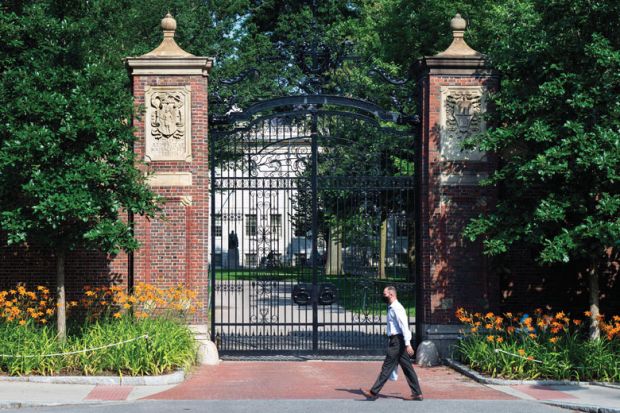Elite US universities are emerging from the pandemic in strong shape, boasting record numbers of applications and rejections, while the rest of higher education searches for signs of recovery.
A string of Ivy League and similarly ranked institutions has been announcing autumn semester acceptance rates in the single digits or low double digits, buoyed by single-year jumps in applications of a third, a half or more.
They include Harvard University, which reported more than 57,000 applications for fewer than 2,000 seats, touting it as “a marked increase” from 40,000 a year ago. That, it said, led to a record-low acceptance rate of 3.4 per cent.
Others with sizeable year-on-year jumps in the number of applications included Colgate University, at 103 per cent; the Massachusetts Institute of Technology, 66 per cent; Boston College, 36 per cent; Tufts University, 35 per cent; the University of Pennsylvania, 34 per cent; and Yale University, 33 per cent.
Many prominent public institutions also enjoyed the bounty. They include the University of Georgia, with a 37 per cent rise in applications; the University of California, Berkeley, 27 per cent; and the University of Virginia, 17 per cent.
Outside that rarefied air, however, the picture for US higher education as the world tries to emerge from the pandemic is decidedly more mixed. Among the more alarming examples was a 20 per cent fall in applications to the 64-campus State University of New York system.
SUNY’s direction appeared more typical as the college-age population in the US declines, and the rise in applications at big-name campuses is more a reflection of opportunity and ambition than of total demand.
That’s the result of a combination of factors including the growing ease with which would-be students can apply to multiple institutions, and the increased incentive to do just that created by the wide abandonment of standardised testing requirements.
Three-quarters of accredited four-year US institutions made the SAT and ACT tests optional this year, and thus an already growing trend ballooned during a pandemic that has restricted in-person gatherings.
“There’s absolutely no doubt in anyone’s mind that eliminating the SAT requirement was what drove the vast majority of the application increase this year,” said Jon Boeckenstedt, vice-provost of enrolment management at Oregon State University.
“The first year of ‘test optional’ at any institution is where students hear ‘ability optional’ rather than ‘test optional’.”
Nevertheless, this could bring real opportunity for traditionally under-represented populations to make meaningful inroads into the sector’s top echelons.
Harvard pointed out that 20 per cent of the students it accepted for the autumn semester are eligible for the Pell Grant, the main federal subsidy for low-income students. About 17 per cent of Harvard students now qualify for a Pell Grant, up from about 11 per cent a decade earlier.
But even with the massive jumps in applications, several elite institutions intentionally admitted fewer students for this fall, said Christine Chu, an admissions counsellor with IvyWise.
The reasons for that may vary, but could well reflect institutions juggling an unusually large number of students who deferred their acceptances last year rather than begin college in the middle of the pandemic.
One possible advantage of the widening divide between the elites and the rest of US higher education, Mr Boeckenstedt said, was that it could lead to the main bulk of US universities finally giving up the chase and concentrating more seriously on their own missions.
“The farther those places get ahead in the arms race, the more likely it is that other institutions will give up on trying to emulate or trying to be like them,” he said.
Register to continue
Why register?
- Registration is free and only takes a moment
- Once registered, you can read 3 articles a month
- Sign up for our newsletter
Subscribe
Or subscribe for unlimited access to:
- Unlimited access to news, views, insights & reviews
- Digital editions
- Digital access to THE’s university and college rankings analysis
Already registered or a current subscriber? Login




